What Are the Benefits of Andrographis Paniculata? Key Health Insights
Andrographis paniculata, commonly known as the “King of Bitters,” has emerged as one of the most researched medicinal herbs in modern science. This powerful plant offers significant benefits including immune system support, anti-inflammatory effects, antiviral properties, and potential protection against respiratory infections. Native to South and Southeast Asia, andrographis contains potent compounds called andrographolides that deliver these therapeutic effects.

The herb has gained considerable attention for its ability to reduce the severity and duration of cold and flu symptoms. Research demonstrates that andrographis can enhance immune function while providing antioxidant protection against cellular damage. Traditional medicine systems have used this versatile plant for centuries to treat conditions ranging from digestive issues to respiratory ailments.
Modern studies continue to validate many traditional uses while uncovering new potential applications. The plant’s active compounds show promise for supporting liver health, reducing inflammation, and potentially offering neuroprotective benefits. Understanding these evidence-based benefits can help individuals make informed decisions about incorporating andrographis into their health regimen.
Key Takeaways
- Andrographis paniculata provides powerful immune system support and antiviral effects through its active andrographolide compounds
- The herb offers significant anti-inflammatory and antioxidant properties that may help protect against various health conditions
- Research supports its traditional uses for respiratory infections while revealing new potential benefits for liver health and cognitive function
What Is Andrographis Paniculata?

Andrographis paniculata is a medicinal herb native to South and Southeast Asia with distinctive bitter compounds and therapeutic properties. This annual plant belongs to the Acanthaceae family and contains potent bioactive compounds that have made it valuable in traditional medicine systems for centuries.
Botanical Characteristics
Andrographis paniculata grows as a slender annual herb that typically reaches heights of 30-110 centimeters. The plant features lance-shaped leaves that are arranged oppositely along square stems, characteristic of the Acanthaceae family.
The leaves measure 2-12 centimeters in length and display a dark green color with prominent veins. Small white flowers with purple spots bloom in terminal and axillary clusters during the flowering season.
The plant thrives in tropical and subtropical climates across India, Sri Lanka, Thailand, and other Southeast Asian countries. It prefers well-drained soil and can tolerate both full sun and partial shade conditions.
The entire plant above ground, including leaves, stems, and roots, contains the therapeutic compounds that make it medicinally valuable. Andrographis is known as the “King of Bitters” due to its intensely bitter taste, which intensifies during the plant’s maturation.
Other Common Names and Taxonomy
The plant is widely known as King of Bitters due to its extremely bitter taste profile. In India, it carries the traditional name Kalmegh, which translates to “dark cloud” in reference to its bitter properties.
Other regional names include Green Chiretta, Indian Echinacea, and Creat. Andrographis paniculata is also referred to as “Indian echinacea” in Western herbal medicine circles.
Taxonomic Classification:
- Kingdom: Plantae
- Family: Acanthaceae
- Genus: Andrographis
- Species: A. paniculata
The scientific name Andrographis paniculata was first described by botanists, with “paniculata” referring to the plant’s panicle-type flower arrangement. The Acanthaceae family includes over 4,000 species of flowering plants, many of which possess medicinal properties.
Active Compounds and Phytochemicals
The primary bioactive compounds in andrographis paniculata are diterpenoids, with andrographolide being the most abundant and well-studied. Andrographolide typically comprises 0.8-4% of the plant’s dry weight and serves as the standardization marker for quality extracts.
Key Diterpenoids:
- Andrographolide – Primary active compound
- Neoandrographolide – Secondary diterpenoid
- Deoxyandrographolide – Additional therapeutic compound
The plant also contains significant levels of flavonoids and polyphenols that contribute to its antioxidant properties. These include quercetin, luteolin, and various glycosides that enhance the overall therapeutic effects.
Research indicates that andrographis possesses several constituents with unique biological properties, including antimicrobial, anti-inflammatory, and immunostimulant functions. The concentration of these phytochemicals varies based on growing conditions, harvest timing, and plant part used.
Additional compounds include diterpene glycosides, phenolic acids, and trace amounts of essential oils that work synergistically with the primary diterpenoids.
Traditional Uses and Historical Significance

Andrographis paniculata has served as a cornerstone medicinal herb across Asian traditional medicine systems for thousands of years. The plant’s therapeutic applications span from treating infectious diseases to supporting digestive health in Ayurvedic, Chinese, and other cultural healing traditions.
Role in Ayurveda
Ancient Ayurvedic texts document Andrographis paniculata’s use for ailments ranging from fever to digestive issues, establishing it as a fundamental natural remedy in this traditional medicine system.
Ayurvedic practitioners classify Andrographis as a bitter tonic with cooling properties. The herb balances excess pitta dosha, making it valuable for inflammatory conditions and heat-related disorders.
Traditional formulations incorporate the plant for treating:
- Respiratory infections and bronchitis
- Liver disorders and jaundice
- Skin conditions and wounds
- Gastrointestinal complaints
- Intermittent fevers
Ayurvedic texts describe Andrographis as Kalmegh, meaning “dark cloud,” referencing its intensely bitter taste. Practitioners traditionally prepared fresh leaf juice or dried powder decoctions for therapeutic use.
Traditional Chinese Medicine Applications
Traditional Chinese Medicine systems have utilized Andrographis paniculata for treating diarrhea, flu, upper respiratory infections, and sinusitis among numerous other conditions.
Chinese herbalists know the plant as Chuan Xin Lian, meaning “thread-the-heart lotus.” They classify it as having cold energetic properties with bitter and sweet tastes.
The medicinal herb addresses multiple TCM patterns:
| Condition | TCM Pattern | Traditional Application |
|---|---|---|
| Respiratory infections | Wind-heat invasion | Clearing lung heat |
| Digestive disorders | Damp-heat in intestines | Drying dampness |
| Skin eruptions | Blood heat | Cooling blood |
| Urinary infections | Damp-heat in bladder | Clearing heat toxins |
TCM practitioners combine Andrographis with other herbs in complex formulas. Common pairings include Forsythia and Honeysuckle for respiratory conditions.
Historical Use in Other Cultures
Southeast Asian cultures developed distinct applications for this medicinal herb. Thai traditional medicine employs Andrographis for snake bites and venomous animal wounds.
Malaysian healers historically used the plant for:
- Malaria prevention during monsoon seasons
- Wound healing through topical leaf poultices
- Digestive complaints via bitter leaf preparations
- General health maintenance as a seasonal tonic
Indonesian traditional medicine incorporates Andrographis into complex polyherbal remedies. Practitioners combine it with local medicinal plants to enhance therapeutic effects.
Modern ethnobotanical studies reveal widespread traditional use across rural communities throughout Asia. Villages often cultivate Andrographis in medicinal gardens for immediate healthcare needs.
Andrographis paniculata strengthens immune function through multiple pathways while demonstrating direct antiviral activity against various pathogens. The herb reduces the severity and duration of upper respiratory tract infections and provides measurable relief from cold and flu symptoms.
Enhancing Immune Function
Andrographis paniculata stimulates the immune system through its high concentration of andrographolide lactones. These compounds activate immune cells and enhance the body’s natural defense mechanisms.
The herb modulates immune response by increasing white blood cell activity. This enhanced cellular function helps the body recognize and eliminate pathogens more effectively.
Clinical studies demonstrate that andrographis extract boosts immune markers in healthy individuals. Regular supplementation shows measurable improvements in immune cell counts and activity levels.
Key immune-supporting mechanisms include:
- Enhanced white blood cell production
- Increased natural killer cell activity
- Improved antigen recognition
- Strengthened cellular immune response
The immunomodulatory properties help balance immune function without causing excessive inflammatory responses. This balanced approach supports long-term immune health rather than temporary stimulation.
Reduction of Upper Respiratory Tract Infections
Clinical trials show andrographis reduces upper respiratory tract infection symptoms with significant efficacy compared to placebo treatments. KalmCold™ demonstrated 2.1 times higher effectiveness than placebo in 223 patients.
The herb shortens infection duration and reduces symptom severity in respiratory conditions. Patients experience faster recovery times and less intense symptoms when using standardized extracts.
URTI symptom improvements include:
- Reduced throat irritation
- Decreased nasal congestion
- Less frequent coughing
- Lower fever intensity
- Shortened illness duration
Double-blind studies confirm andrographis extract effectiveness for respiratory health support. The herb demonstrates consistent results across multiple clinical investigations involving hundreds of participants.
Relief from Common Cold and Flu Symptoms
Andrographis provides measurable relief from common cold symptoms through its anti-inflammatory and antiviral compounds. Clinical studies demonstrate significant symptom reduction compared to placebo groups.
Kan Jang™ showed superior efficacy to placebo in reducing clinical symptoms among 59 common cold patients. The standardized extract provided faster symptom resolution and improved patient comfort.
Common cold symptom relief includes:
- Reduced runny nose
- Less severe headaches
- Decreased body aches
- Lower throat pain intensity
- Improved energy levels
The herb’s bitter compounds contribute to its therapeutic effects on respiratory symptoms. These active constituents work synergistically to provide comprehensive cold and flu support.
Flu symptom management occurs through multiple pathways including direct antiviral activity. The compounds interfere with viral replication while supporting the body’s natural healing processes.
Andrographolide demonstrates antiviral properties against both DNA and RNA viruses including herpes simplex virus, influenza, and HIV. The compound inhibits viral entry, replication, and protein formation.
Viruses affected by andrographis compounds:
- Herpes simplex virus 1 (HSV-1)
- Influenza virus A
- Human immunodeficiency virus (HIV)
- Epstein-Barr virus
- Japanese encephalitis virus
- Dengue virus
The herb shows activity against Staphylococcus aureus and other bacterial pathogens. This broad-spectrum antimicrobial effect enhances overall infection resistance.
Viral replication inhibition occurs through multiple mechanisms. Andrographolide interferes with viral gene expression and prevents the formation of functional viral proteins.
Research indicates potential effectiveness against SARS-CoV-2 through main protease inhibition. In silico studies suggest andrographolide may serve as a coronavirus treatment option.
Anti-Inflammatory and Antioxidant Effects
Andrographis paniculata delivers powerful anti-inflammatory and antioxidant properties through its primary compound andrographolide, which targets multiple inflammatory pathways while neutralizing harmful free radicals. These dual mechanisms provide therapeutic benefits for conditions ranging from respiratory disorders to chronic inflammatory diseases.
Reduction of Inflammation
The plant’s anti-inflammatory effects operate through several key pathways, making it effective against various inflammatory conditions. Andrographolide inhibits the NF-κB signaling pathway, which controls the production of inflammatory mediators.
Research demonstrates that andrographolide blocks specific inflammatory pathways including:
- JAK1/STAT3 pathway – reduces inflammatory cytokine production
- MAPK signaling – controls cellular inflammatory responses
- NLRP3 inflammasome – prevents excessive immune activation
Clinical studies show the compound reduces inflammation in respiratory conditions like asthma and COPD. It decreases inflammatory cell infiltration and suppresses pro-inflammatory molecules.
The herb’s anti-inflammatory properties extend to digestive disorders. Studies indicate it blocks IL-4R-STAT6 and IL-23/IL-17 pathways in colitis models, reducing intestinal inflammation and tissue damage.
Protection Against Oxidative Stress
Andrographis paniculata provides significant antioxidant properties that combat oxidative stress at the cellular level. The plant activates the Nrf2 signaling pathway, which regulates antioxidant enzyme production.
Key antioxidant mechanisms include:
- Free radical scavenging – neutralizes reactive oxygen species
- Enzyme activation – boosts natural antioxidant defenses
- Cellular protection – prevents oxidative damage to tissues
The compound increases activity of antioxidant enzymes like glutathione peroxidase and superoxide dismutase. These enzymes neutralize free radicals before they damage cellular structures.
Research shows andrographolide activates Nrf2 expression through p38 MAPK pathways. This activation enhances the body’s natural antioxidant defense systems and reduces oxidative stress markers.
Relief for Chronic Conditions
The combined anti-inflammatory and antioxidant effects make andrographis effective for managing chronic inflammatory conditions. Studies document benefits for osteoarthritis, liver fibrosis, and autoimmune disorders.
For joint health, andrographolide suppresses MAPK pathways and reduces cartilage-degrading enzyme activity. It inhibits inflammatory cytokines that contribute to joint destruction and pain.
Liver protection occurs through multiple mechanisms:
- Hepatic enzyme modulation – improves liver detoxification
- Fibrosis reduction – prevents excessive scar tissue formation
- Inflammatory suppression – reduces hepatic inflammation
The herb demonstrates adaptogen-like qualities by helping the body manage chronic stress and inflammation. It modulates immune responses without causing excessive suppression or activation.
Research indicates the compound reduces nitric oxide production in inflammatory conditions while maintaining beneficial immune functions.
Benefits for Specific Health Conditions
Andrographis paniculata demonstrates targeted therapeutic effects for several chronic health conditions. The herb’s anti-inflammatory compounds and immune-modulating properties provide specific benefits for joint inflammation, digestive disorders, and liver dysfunction.
Arthritis and Joint Health
Andrographis paniculata contains potent anti-inflammatory compounds that specifically target joint inflammation associated with arthritis. The primary bioactive component, andrographolide, inhibits inflammatory pathways that contribute to joint pain and swelling.
Clinical studies demonstrate that andrographis supplementation reduces inflammatory markers linked to arthritis progression. The herb’s anti-inflammatory action helps decrease the production of pro-inflammatory cytokines that damage cartilage and joint tissues.
Key anti-arthritic mechanisms include:
- Reduction of TNF-α and IL-6 inflammatory cytokines
- Inhibition of inflammatory enzyme pathways
- Protection of cartilage from oxidative damage
Regular use may help manage chronic joint pain and improve mobility in individuals with inflammatory joint conditions. The herb’s natural compounds work similarly to conventional anti-inflammatory medications but with fewer reported side effects.
Digestive and Gut Health
Research shows that andrographis restores gut health by suppressing inflammation and supporting intestinal immune function. The herb’s ethanolic extract significantly reduces bacterial colonization while enhancing the gut’s natural defense mechanisms.
Andrographis modulates intestinal health by increasing mucin production and lysozyme expression. These compounds strengthen the intestinal barrier and provide antimicrobial protection against harmful pathogens.
Digestive benefits include:
- Enhanced secretory IgA production for immune defense
- Reduced inflammatory cytokines in intestinal tissues
- Improved epithelial barrier integrity
- Balanced gut microbiota composition
The herb demonstrates particular effectiveness against Salmonella infections and other bacterial threats to digestive health. It helps normalize inflammatory responses while supporting beneficial immune activity in the gastrointestinal tract.
Liver Health and Hepatoprotective Effects
Andrographis paniculata exhibits strong antioxidant and inflammation-fighting properties that protect liver function. The herb’s hepatoprotective compounds help prevent and reverse various forms of liver damage.
Studies indicate that andrographis protects against drug-induced liver toxicity and supports liver regeneration. The herb’s bioactive compounds neutralize harmful free radicals that contribute to hepatic inflammation and cellular damage.
Liver protective mechanisms:
- Reduction of oxidative stress markers
- Enhanced antioxidant enzyme activity
- Decreased inflammatory cytokine production
- Support for natural detoxification processes
The herb shows promise for managing fatty liver disease, hepatitis, and other inflammatory liver conditions. Its hepatoprotective effects help maintain optimal liver function while supporting the organ’s natural healing capacity.
Cognitive and Neurological Effects
Andrographis paniculata demonstrates significant potential for enhancing cognitive function through multiple pathways, including memory improvement and neuroprotection. The plant’s bioactive compounds work to support neurogenesis and reduce neuroinflammation, offering protection against age-related cognitive decline.
Cognitive Function and Brain Health
Research indicates that andrographis provides several cognitive benefits through its active compound andrographolide. Studies show the plant can enhance memory, learning, and concentration while reducing mental fatigue and brain fog.
The herb’s primary mechanism involves supporting neurogenesis, the formation of new brain cells. This process is crucial for maintaining cognitive function as individuals age.
Key cognitive benefits include:
- Improved memory consolidation and recall
- Enhanced focus and attention span
- Reduced mental fatigue
- Better information processing speed
Clinical trials with healthy volunteers showed modest improvements in memory and attention following andrographis supplementation. These findings suggest the plant may help maintain cognitive performance under stress.
Neuroprotective and Adaptogenic Properties
Andrographis exhibits powerful neuroprotective effects by modulating neuroinflammation and neurodegenerative processes. The plant’s compounds work to reduce inflammatory markers and oxidative stress in brain tissue.
The herb shows particular promise for protecting against neurodegenerative diseases like Alzheimer’s and Parkinson’s disease. Its anti-inflammatory properties help prevent the chronic neuroinflammation associated with cognitive decline.
Neuroprotective mechanisms:
- Reduced oxidative stress in brain cells
- Decreased inflammatory cytokines like TNF-α and IL-1β
- Enhanced antioxidant enzyme activity
- Stabilized neuronal membranes
Studies demonstrate that andrographolide can reduce abnormal electrical activity in conditions like epilepsy. The compound also shows adaptogenic properties, helping the brain cope with various stressors while maintaining optimal function.
Supplement Forms, Dosage, and Safety
Andrographis paniculata supplements come in multiple forms with varying concentrations of active compounds, requiring careful attention to standardization and proper dosing. Understanding potential side effects and contraindications is essential for safe supplementation.
Types of Andrographis Paniculata Supplements
Capsules represent the most popular form of andrographis paniculata supplements due to their convenience and ability to mask the herb’s intensely bitter taste. These typically contain standardized powder or extract ranging from 200-500mg per capsule.
Tablets offer similar benefits to capsules but may include additional binding agents. They often provide higher concentrations of active compounds and allow for scored divisions to adjust dosing.
Tinctures provide liquid extracts that offer faster absorption than solid forms. Most tinctures contain alcohol-based extracts with ratios typically ranging from 1:1 to 1:5, requiring smaller doses measured in drops or milliliters.
Standardized extracts in powder form allow for flexible dosing and can be mixed into beverages. These concentrates often provide 10% or higher andrographolide content.
Teas made from dried andrographis leaves offer the most traditional preparation method. However, the extreme bitterness makes this form challenging for many users to consume regularly.
Standardized Extracts and Quality
Quality andrographis supplements should specify their andrographolide content, which serves as the primary marker for potency. Most therapeutic extracts contain 10-20% andrographolides, with some concentrated forms reaching up to 50%.
Third-party testing for heavy metals, pesticides, and microbial contamination ensures product safety. Reputable manufacturers provide certificates of analysis showing these test results.
Good Manufacturing Practices (GMP) certification indicates that facilities follow proper quality control procedures. This certification helps ensure consistent potency and purity across batches.
Consumers should look for products that clearly state the andrographolide percentage and total milligrams per serving. Vague labeling like “proprietary blend” often indicates lower quality or unknown potency levels.
Recommended Dosage and Usage
Standard dosage of andrographis varies significantly based on the extract concentration and intended use. Most clinical studies have used doses ranging from 300-1200mg daily of standardized extract.
For immune support: 300-400mg of standardized extract (10% andrographolides) taken 2-3 times daily represents typical dosing protocols used in research studies.
Acute conditions: Higher doses up to 1200mg daily may be appropriate for short-term use, typically divided into 2-3 doses throughout the day.
Tincture dosing generally requires 2-4ml taken 2-3 times daily, though this varies based on the extraction ratio and concentration.
Taking andrographis with food can help reduce potential stomach upset. The bitter compounds responsible for therapeutic effects may cause nausea when taken on an empty stomach.
Potential Side Effects and Precautions
Andrographis can cause several side effects, particularly when used in higher doses or for extended periods. Common side effects include loss of appetite, diarrhea, vomiting, rash, headache, runny nose, and fatigue.
Serious adverse effects may occur with high doses or long-term use, including swollen lymph glands, allergic reactions, and elevated liver enzymes.
Pregnancy and breastfeeding: Andrographis should be avoided during pregnancy as it may cause miscarriage. Safety during breastfeeding has not been established.
Drug interactions may occur with anticoagulant medications, as andrographis can affect blood clotting. Individuals taking blood thinners should consult healthcare providers before use.
Autoimmune conditions: People with multiple sclerosis, lupus, or other autoimmune disorders should avoid andrographis as it may stimulate immune system activity.
Fertility concerns: Some research suggests andrographis may reduce fertility in both men and women, though more studies are needed to confirm this effect.
Emerging Research and Additional Benefits
Recent studies reveal andrographis paniculata’s potential in cancer prevention through cellular protection mechanisms, while preliminary research suggests benefits for cholesterol management and insulin regulation. Specialized investigations also explore its therapeutic applications for complex conditions like Gulf War illness.
Cancer Prevention and Anticancer Properties
Research demonstrates that andrographolide exhibits anti-cancer properties through multiple mechanisms. Laboratory studies show the compound can inhibit cancer cell growth and induce programmed cell death in various cancer types.
The plant’s bioactive compounds interfere with cancer cell division and proliferation. Studies indicate andrographolide may prevent tumor formation by blocking specific cellular pathways involved in cancer development.
Key anticancer mechanisms include:
- Cell cycle arrest in cancer cells
- Induction of apoptosis (programmed cell death)
- Inhibition of angiogenesis (blood vessel formation in tumors)
- Reduction of inflammatory markers linked to cancer risk
Clinical trials remain limited, but preclinical research suggests promise for breast, colon, and liver cancers. The anti-inflammatory and antioxidant properties may contribute to cancer prevention by reducing oxidative stress and chronic inflammation.
Impacts on Cholesterol and Insulin Sensitivity
Emerging research indicates andrographis paniculata may support metabolic health through cholesterol regulation and improved insulin function. Animal studies demonstrate significant reductions in total cholesterol and LDL levels following treatment with plant extracts.
The herb appears to enhance insulin sensitivity in laboratory models. Researchers observe improved glucose uptake in cells and better blood sugar control in diabetic animal subjects.
Metabolic benefits observed in studies:
- Reduced total cholesterol levels
- Decreased LDL (bad) cholesterol
- Improved insulin receptor sensitivity
- Enhanced glucose metabolism
Human trials remain preliminary, but initial findings suggest potential for managing metabolic syndrome. The anti-diabetic properties may work through multiple pathways affecting both glucose and lipid metabolism.
Potential Role in Gulf War Illness Management
Specialized research explores andrographis paniculata’s application in Gulf War illness, a complex condition affecting military veterans. The herb’s anti-inflammatory and immune-modulating properties align with therapeutic targets for this syndrome.
Gulf War illness involves multiple symptoms including fatigue, cognitive dysfunction, and immune system irregularities. Andrographis compounds may address several underlying mechanisms contributing to these symptoms.
Research focuses on the plant’s ability to reduce neuroinflammation and support immune system balance. Preliminary studies suggest potential benefits for cognitive symptoms and energy levels in affected individuals.
The herb’s adaptogenic properties may help restore normal physiological function disrupted in Gulf War illness. However, clinical evidence remains limited and requires further investigation to establish efficacy and safety protocols.
Frequently Asked Questions
Andrographis paniculata addresses specific health conditions through its active compound andrographolide, which provides anti-inflammatory and antiviral effects. Clinical research demonstrates measurable benefits for respiratory infections, inflammatory conditions, and immune system support.
What health conditions does Andrographis Paniculata address effectively?
Research shows andrographis paniculata effectively treats respiratory infections including the common cold. A 2017 review of 33 randomized controlled trials found it improved acute respiratory tract infection symptoms by shortening cough and sore throat duration.
The herb demonstrates effectiveness for osteoarthritis pain relief. A 2019 study showed significant pain reduction in people with mild to moderate knee osteoarthritis after 28 days of supplementation.
Clinical trials indicate benefits for ulcerative colitis. A 2012 randomized controlled trial found 34% to 38% of participants achieved remission after 8 weeks compared to 25% in the placebo group.
Traditional medicine systems use andrographis for fever, influenza, malaria, diabetes, and high blood pressure. However, clinical evidence varies for these applications.
How does Andrographis Paniculata impact immune system function?
Andrographis paniculata functions as a natural immune-booster through its andrographolide compounds. These bioactive constituents provide antioxidant, anti-inflammatory, and antiviral effects that enhance immune system response.
The herb reduces inflammatory cytokines in the body. Cytokines trigger inflammation around affected areas, so reducing their levels helps moderate immune system overactivity.
Research suggests andrographis may promote the death of specific immune cells that cause inflammation in rheumatoid arthritis. This selective immune modulation helps balance immune function rather than suppressing it entirely.
The plant’s immune-supporting properties work particularly well for respiratory tract infections. Clinical studies demonstrate shortened duration and reduced severity of cold symptoms.
Are there any clinically supported therapeutic properties of Andrographis Paniculata?
Multiple clinical trials support andrographis paniculata’s anti-inflammatory properties. The herb reduces inflammatory proteins responsible for various conditions including arthritis and ulcerative colitis.
Antiviral effects receive substantial research backing. Studies demonstrate effectiveness against respiratory viruses and potential benefits for similar symptoms in mild COVID-19 cases.
A 2011 randomized controlled trial found andrographis extract as effective as mesalazine drug treatment for mild to moderate ulcerative colitis. This demonstrates comparable efficacy to pharmaceutical interventions.
The herb’s antibacterial properties complement its antiviral effects. These dual antimicrobial actions provide broad-spectrum protection against various pathogens.
Can Andrographis Paniculata be used to treat common colds and respiratory infections?
Clinical evidence strongly supports andrographis paniculata’s effectiveness for treating common cold and respiratory infection symptoms. The 2017 review of 33 randomized controlled trials demonstrated consistent benefits for acute respiratory tract infections.
The herb specifically reduces cough duration and sore throat severity. These improvements occur through andrographolide’s anti-inflammatory and antiviral mechanisms targeting respiratory tract tissues.
More recent 2023 research shows continued benefits for upper respiratory tract infections. However, some results lack statistical significance, indicating need for additional studies.
The recommended dosage for respiratory infections is 300 milligrams four times daily for 3 to 4 consecutive days. This short-term treatment protocol minimizes side effects while maximizing therapeutic benefits.
What are the potential side effects associated with the use of Andrographis Paniculata?
Andrographis paniculata is generally safe for short-term use with uncommon side effects. Reported adverse reactions include diarrhea, vomiting, skin rashes, headaches, fatigue, and loss of appetite.
Pregnant women should avoid andrographis supplements due to miscarriage risk. Nursing mothers should also avoid use since safety during breastfeeding remains unclear.
People with scheduled surgeries should discontinue use beforehand. The herb may have blood-thinning properties that could increase bleeding risks during procedures.
Individuals with autoimmune diseases require caution since andrographis may increase immune system activity. This could potentially worsen autoimmune condition symptoms.
People with liver disease should monitor ALT levels carefully. Andrographis use may increase alanine aminotransferase levels associated with liver damage.
How does Andrographis Paniculata compare to standard treatments in terms of efficacy?
Research demonstrates andrographis paniculata matches pharmaceutical treatment effectiveness in specific conditions. The 2011 clinical trial showed equivalent efficacy to mesalazine for treating mild to moderate ulcerative colitis.
For respiratory infections, andrographis provides measurable symptom improvement similar to conventional treatments. The herb offers additional benefits of immune system support rather than just symptom suppression.
Osteoarthritis pain relief from andrographis supplementation shows significant clinical benefits. The 2019 study demonstrated meaningful pain reduction comparable to other natural anti-inflammatory treatments.
The herb’s safety profile often exceeds pharmaceutical alternatives for short-term use. Side effects occur less frequently and with reduced severity compared to many conventional medications.
Long-term comparative studies remain limited. Most research focuses on short-term treatment periods of several weeks to months rather than extended therapeutic use.
Top Andrographis Paniculata Products

Himalaya PartySmart, 12 Capsule Tube – Alcohol Breakdown Liver Support for a Better Morning After Drinking – Plant Based, Vegan, Non-GMO, Gluten Free, Clinically Studied
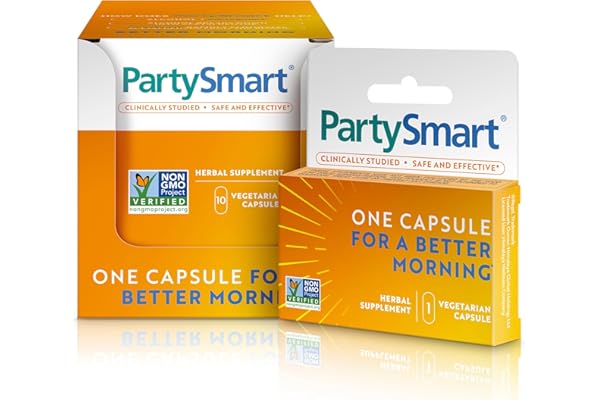
Himalaya PartySmart, 10 Individual Capsules – Alcohol Breakdown Liver Support for a Better Morning After Drinking – Plant Based, Vegan, Non-GMO, Gluten Free, Clinically Studied
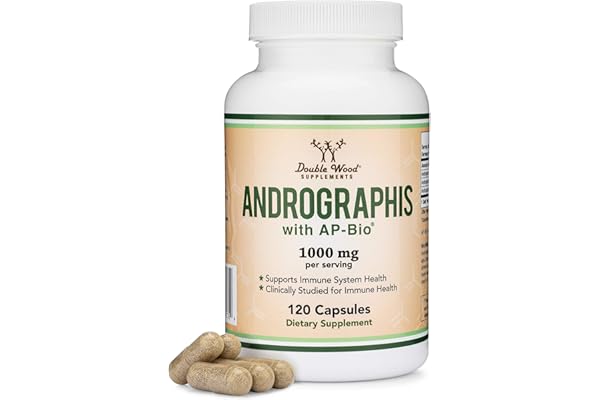
Andrographis Capsules Max Andrographides – 1,000mg Serving Size (120 Capsules) with AP-Bio (Patented Andrographis Paniculata Extract) – Clinically Studied for Immune System Health by Double Wood
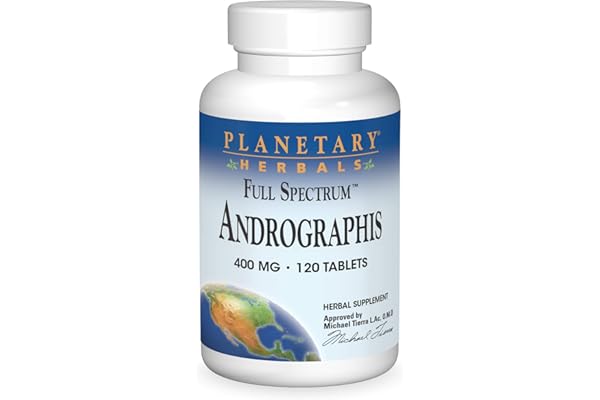
Planetary Herbals Full Spectrum Andrographis 400mg Support Healthy Digestive, Cardiovascular & Unrinary Systems – Support For Healthy Liver & Immune Function – Ayurvedic Herb – 120 Tablets
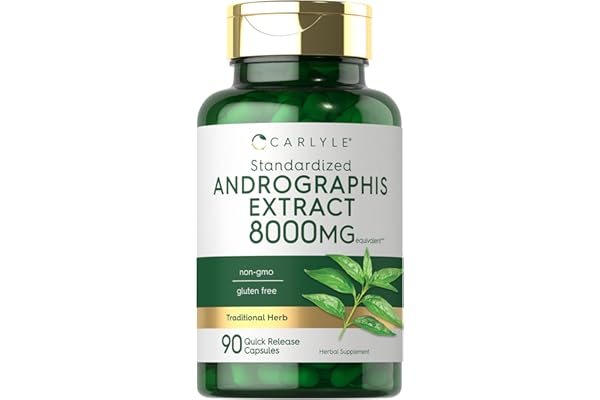
Carlyle Andrographis Paniculata Capsules | 8000mg | 90 Pills | Herb Extract Supplement | Non-GMO and Gluten Free
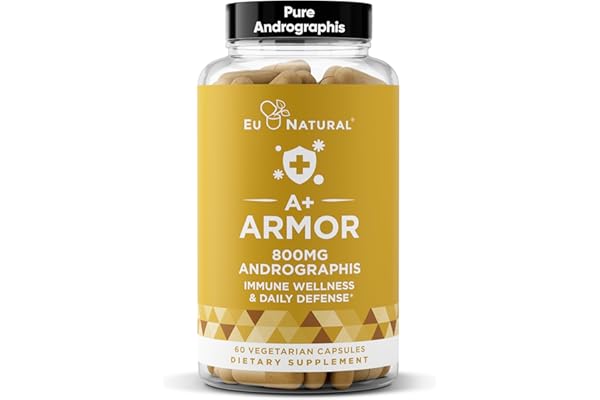
A+ Armor Andrographis Pure 800 Mg – Healthy Immune System Function, Physical Wellness, Potent Strength for Seasonal Protection – Full-Spectrum & Standardized – 60 Vegan Soft Capsules


